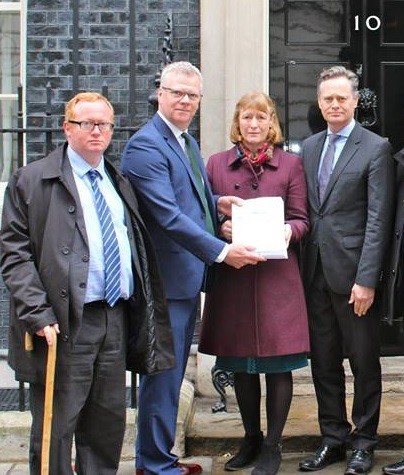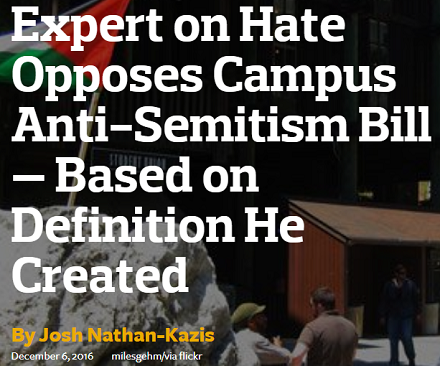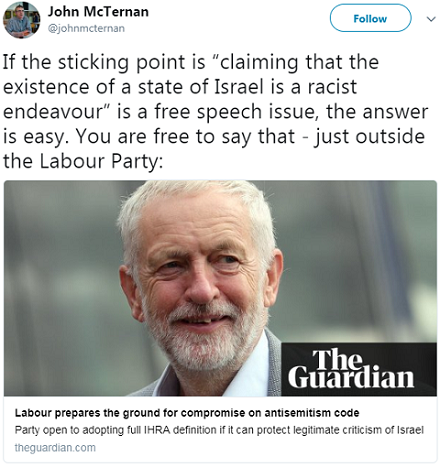Israel as a ‘racist endeavour’ — how the IHRA is used to suppress free speech
 The furore over the wave of antisemitism that has supposedly engulfed the Labour Party under Jeremy Corbyn’s leadership continues to obsess the media, but its impact on the general public and Labour voters has so far been limited.
The furore over the wave of antisemitism that has supposedly engulfed the Labour Party under Jeremy Corbyn’s leadership continues to obsess the media, but its impact on the general public and Labour voters has so far been limited.
A BMG poll for the Independent in April found that only 19% of respondents thought that the party had a “considerable problem” with antisemitism, and most of them were right-wing political opponents of Labour rather than progressive opponents of racism (see my comments here). Another Independent/BMG poll published last week (full details here) similarly found that only 23% of respondents believed Labour is “an institutionally anti-Semitic party”, and that it was supporters of the Tories (51%) and UKIP (43%) who were disproportionately inclined to take that view. By contrast, just 8% of Labour voters thought the party is institutionally antisemitic.
When you bear in mind the uncritical coverage by the mainstream media of even the most off-the-wall accusations by Corbyn’s enemies — that the Jewish community faces an “existential threat” from Labour, for example, or that Margaret Hodge’s treatment by the party was comparable to that of Jews in Nazi Germany in the 1930s — the refusal of the large majority of the British people to buy into the “Labour’s crisis of antisemitism” narrative is both surprising and really quite admirable.
The recent BMG poll also asked respondents their opinion on some of the illustrative examples appended to the International Holocaust Remembrance Alliance definition of antisemitism, which is currently the subject of controversy because of the Labour Party’s refusal to adopt all the examples verbatim. The poll found no majority support for the view that any of the examples were antisemitic. For example, 38% of respondents said they believed that “claiming Israel’s existence as a state is a racist endeavour” is an example of antisemitism. This is the example that the Labour Party has so far declined to accept, provoking the usual furious denunciations from Corbyn’s political opponents, who have demanded that the party should adopt the IHRA document in its entirety.

The origins of the “IHRA definition” should be subjected to critical analysis. The UK delegates to the IHRA claim that the definition with its illustrative examples was “drafted with input from many of the world’s foremost experts on antisemitism”, and they refer to “the months of international diplomacy and academic rigour that enabled this definition to exist”. The reality, though, is that the IHRA just copied-and-pasted the text from an old, discarded “working definition of antisemitism” produced by the European Monitoring Centre on Racism and Xenophobia back in 2005.
That definition was inspired by the theory of the “new antisemitism”, which conflates antisemitism and anti-Zionism. As such it came under heavy criticism and consequently was never formally adopted by the EUMC. In his 2015 Sub-Report for the Parliamentary Committee on Antisemitism, David Feldman wrote that the “criticisms have been damaging and the EUMC working definition largely has fallen out of favour. The EUMC’s successor organisation, the Fundamental Rights Agency, no longer carries the working definition on its website.”
 This was not at all to the liking of the Zionist lobby, for whom the “new antisemitism” plays a vital role in delegitimising opposition to the state of Israel by falsely equating it with antisemitism. So they had to find a way of resurrecting the defunct “working definition”. Their chosen vehicle for achieving this objective was the IHRA.
This was not at all to the liking of the Zionist lobby, for whom the “new antisemitism” plays a vital role in delegitimising opposition to the state of Israel by falsely equating it with antisemitism. So they had to find a way of resurrecting the defunct “working definition”. Their chosen vehicle for achieving this objective was the IHRA.
As Ben White has detailed in his book Cracks in the Wall: Beyond Apartheid in Palestine/Israel, a central role was played by Mark Weitzman, who is a senior official at the US-based Simon Wiesenthal Center — an aggressively Zionist organisation which, White points out, has “embraced the idea of a ‘new anti-Semitism’ to the extent that it does not not even pretend to separate fighting anti-Semitic hate and defending Israel”. Crucially, Weitzman chaired the IHRA’s committee on antisemitism and Holocaust denial. “It was under Weitzman’s chairmanship”, Ben White writes, “that the IHRA committee proposed, in 2015, a definition of anti-Semitism which almost exactly replicated the discredited EUMC ‘working definition’. In May 2016, the IHRA duly adopted it.”
It would be interesting to have further details about the process that led to the IHRA’s adoption of a controversial text which reproduced almost word-for-word the EUMC’s rejected formulations. “How much discussion was there?” Tony Lerman has asked. “I’m told it was railroaded through, leaving some delegations unhappy.” As he also pointed out, it appears that very few governments have actually adopted the IHRA definition. In fact the overwhelming majority of the 31 countries affiliated to the IHRA itself have yet to do so. Throughout the world only eight states have adopted it. Yet we are repeatedly told that the IHRA document is “an internationally recognised definition of antisemitism”. As Tony Lerman commented: “What a con.”
When the Labour Party drew up a new disciplinary code to deal with antisemitism earlier this year it rightly took account of the problems with the IHRA/EUMC text and adapted it accordingly. The IHRA’s basic 38-word definition was incorporated into the code, as were nearly all the illustrative examples, although some of them were rephrased. In a letter to Labour MPs explaining the new code, the party’s general secretary Jennie Formby wrote: “The only one of the IHRA examples — or rather one part of one example — that is not quoted or explicitly referenced in our code deals with claims about the state of Israel being a ‘racist endeavor.’ The wording in the IHRA example is open to different interpretations and run the risk of prohibiting legitimate criticism of Israel.”
The Palestinian victims of Zionism, of course, have experienced at first hand the racist character of the Israeli state, which is built into its foundations. The Palestinian ambassador, Manuel Hassassian, has written: “Anybody who is serious about understanding the historical context in which Israel was created will know that 750,000 Palestinians were ethnically cleansed by Zionist terror militias and 500 Palestinian villages destroyed. It is difficult not to define this as a racist endeavour.” As Jennie Formby pointed out in her letter: “Palestinians have as much right as any other people to define the discrimination they have experienced as racism, and we cannot uphold one set of rights by infringing another.”

The IHRA formulates the disputed illustrative example as follows: “Denying the Jewish people their right to self-determination, e.g., by claiming that the existence of a State of Israel is a racist endeavor.” Note: not “the State of Israel” but “a State of Israel”. On a literal reading, this does no more than express the general principle that the Jewish people have the right to establish a state. On that basis some liberal Zionists have attempted to dismiss fears that the IHRA’s “racist endeavour” example could be used to suppress free speech on Israel. “You can, if you want, say everything the state of Israel has done since its birth has been racist”, Jonathan Freedland argued in the Guardian. “All it prohibits is branding as a racist endeavour ‘a state of Israel’ — the principle that Jews, like every other people on Earth, should have a home and refuge of their own.”
In fact the IHRA doesn’t even impose a blanket prohibition on describing a state of Israel as racist — it says only that this “could, taking into account the overall context” amount to antisemitism. So according to the IHRA there are some contexts in which describing a state of Israel as a “racist endeavour” may be antisemitic, and other contexts in which it may not. But the IHRA provides no guidance as to what those different contexts might be. In any case, I’ve never yet come across a debate over whether the existence of a state of Israel, in the abstract, is a racist endeavour. The question that is the subject of heated argument is whether the state of Israel is a racist endeavour. Again, the IHRA offers no assistance in determining whether it is antisemitic to answer that question in the affirmative.
In practice, the IHRA’s vague and generalised formulation is interpreted by militant Zionists to mean (a) that it is necessarily antisemitic to describe the actually existing state of Israel as racist, and (b) that there is no context in which it is not antisemitic to say that.
When Theresa May announced at a Conservative Friends of Israel event in December 2016 that the government would formally adopt the IHRA definition of antisemitism, this gave the green light to the Zionist lobby to attack pro-Palestinian activism. Their primary target was Israeli Apartheid Week, an annual series of events intended to expose Israel’s oppression of the Palestinian people and win support for the Boycott, Divestment and Sanctions campaign. Since then, Zionist groups have waged a systematic campaign to get Israeli Apartheid Week events banned from university campuses, on the grounds that calling Israel a racist state is antisemitic according to the IHRA.

Leading the charge has been the Israel Britain Alliance. A project of the Zionist Federation, the IBA was set up in 2016 with Michael McCann as director. McCann is a former Labour MP — he represented East Kilbride, Strathaven & Lesmahagow from 2010 until losing his seat to the SNP in 2015 — and during his short parliamentary career he firmly established his Zionist credentials, serving as a vice-chair of Labour Friends of Israel.
The extremist politics of McCann and the IBA were demonstrated in May this year when they denounced shadow foreign secretary Emily Thornberry over her principled statement condemning the IDF’s shooting of Palestinian protesters at the Gaza/Israel border. McCann angrily complained that Thornberry had chosen to “attack the only democracy in the Middle East with wild accusations that the IDF engaged in the deliberate killing of unarmed civilians”. This was, he declared, “a grave and irresponsible slander”. The protesters gunned down by the IDF were in reality the victims of “a systematic campaign choreographed by the terrorist group Hamas that seeks to compel the IDF to take actions that can subsequently be vilified in the court of public opinion”.
Personally I think McCann is entitled to his views, however loathsome they may be. Others might argue that for a Labour Party member and former MP to publish such a sickening justification of state-sanctioned murder is a prima facie case of bringing the party into disrepute.
In February 2017 McCann told the Jewish News that the Israel Britain Alliance would be using the IHRA definition and examples to target Israeli Apartheid Week. McCann claimed: “That definition gives examples of how anti-Semitism manifests itself in the context of the state of Israel. Denying the Jewish people their right to self-determination, for example, by claiming that the existence of a state of Israel is a racist endeavor…. The charge that Israel is an apartheid state breaches the definition and is anti-Semitic.”

Although the IBA campaign failed to prevent Israeli Apartheid Week going ahead on campuses across the UK in 2017, the Zionist lobby did score some successes in their attempts to block individual IAW events. Notably they pressured the University of Central Lancashire into cancelling an Israeli Apartheid Week panel discussion that had been organised by the UCLan Friends of Palestine society. A spokesperson for UCLan stated: “The UK government has formally adopted the International Holocaust Remembrance Alliance’s new definition of what constitutes antisemitism. We believe the proposed talk contravenes the new definition.” The university had therefore decided that “the proposed event would not be lawful”.
Some 250 academics wrote to the Guardian to “express our dismay at this attempt to silence campus discussion about Israel, including its violation of the rights of Palestinians for more than 50 years. It is with disbelief that we witness explicit political interference in university affairs in the interests of Israel under the thin disguise of concern about antisemitism.”
 In February this year McCann again announced that the IBA would be campaigning against Israeli Apartheid Week on the basis of the IHRA definition. “That definition explains that claiming that the existence of the state of Israel is a racist and illegitimate endeavour is anti-Semitic”, McCann told the Jewish News. “Therefore, by the Government’s own measure, the words ‘Israel Apartheid Week’ are manifestly anti-Semitic and violate the IHRA standard.”
In February this year McCann again announced that the IBA would be campaigning against Israeli Apartheid Week on the basis of the IHRA definition. “That definition explains that claiming that the existence of the state of Israel is a racist and illegitimate endeavour is anti-Semitic”, McCann told the Jewish News. “Therefore, by the Government’s own measure, the words ‘Israel Apartheid Week’ are manifestly anti-Semitic and violate the IHRA standard.”
McCann argued that Israeli Apartheid Week was “used by the Boycott, Divestment and Sanctions movement to demonise and delegitimise the State of Israel”, and he declared that it was “unacceptable for British universities to give these events a venue in the mistaken belief that this is about free speech”.
The problem for McCann and the IBA was that the high-profile controversy over the UCLan ban in 2017 had alerted university authorities to the fact that, although the government had adopted the IHRA definition and examples, this decision had no legal force. Universities were free to ignore it. So as part of this year’s campaign the IBA also launched a petition calling on Theresa May to condemn Israeli Apartheid Week and take steps to incorporate the IHRA definition and illustrative examples into law, so that IAW events could be made illegal. Over 10,000 people signed the petition, which was supported by a number of Zionist groups.
 Here is McCann presenting this deeply anti-democratic petition at 10 Downing Street — supported by fellow Labour right-winger Luke Akehurst, who is director of another extreme Zionist outfit called We Believe in Israel, and by Joan Ryan MP, who is chair of Labour Friends of Israel. (Like the IBA, both We Believe in Israel and Labour Friends of Israel did their best to justify the IDF’s killing and maiming of Palestinian protesters in Gaza.)
Here is McCann presenting this deeply anti-democratic petition at 10 Downing Street — supported by fellow Labour right-winger Luke Akehurst, who is director of another extreme Zionist outfit called We Believe in Israel, and by Joan Ryan MP, who is chair of Labour Friends of Israel. (Like the IBA, both We Believe in Israel and Labour Friends of Israel did their best to justify the IDF’s killing and maiming of Palestinian protesters in Gaza.)
So we can’t say we haven’t been given fair warning of how the Zionist lobby in the Labour Party will exploit the IHRA’s “racist endeavour” example if the party incorporates this into its disciplinary code. They will use it to attack supporters of the Palestinian cause, by smearing them as antisemites, and try to crush all expressions of anti-Zionism.
Also accompanying McCann to Downing Street to present the petition were Matthew Offord of Conservative Friends of Israel, Nigel Dodds and Jim Shannon of the Democratic Unionist Party, Simon Cobbs of Sussex Friends of Israel and Des Starritt, executive director of Christians United for Israel – UK. The role of the latter organisation is worth examining.
Starritt and his boss, US megachurch pastor John Hagee, recently issued a joint appeal urging Christians to sign a declaration that they are “appalled that anti-Semitism exists and is allowed to thrive within the Labour Party and strongly oppose how cases have been handled by the current Labour leadership”. The declaration demands that “the International Holocaust Remembrance Alliance (IHRA) definition of anti-Semitism and all its stated examples should be accepted by the Labour Party in its entirety”.
Unsurprisingly, Christians United for Israel has been an enthusiastic participant in the campaign to suppress Israeli Apartheid Week. A CUFI statement in February condemned IAW as “part of a hostile campaign to delegitimise and demonise Israel. And it is based entirely on LIES”. The statement continued: “IAW also contravenes the International Definition of Antisemism that the Government adopted last year, which states that ‘claiming that the existence of the State of Israel is a racist and illegitimate endeavour is antisemitic’. In Partnership with Israel Britain Alliance, we are calling upon Theresa May to denounce IAW and if necessary introduce legislation to end these events.”
 Its UK affiliate may be small, but in the US, under the leadership of John Hagee, Christians United for Israel has established itself as a major component of the Zionist lobby. However, as one critic has pointed out: “CUFI has an ulterior agenda: its support for Israel derives from the belief of Hagee and his flock that Jesus will return to Jerusalem after the battle of Armageddon and cleanse the earth of evil. In the end, all the non-believers — Jews, Muslims, Hindus, mainline Christians, etc. — must convert or suffer the torture of eternal damnation.”
Its UK affiliate may be small, but in the US, under the leadership of John Hagee, Christians United for Israel has established itself as a major component of the Zionist lobby. However, as one critic has pointed out: “CUFI has an ulterior agenda: its support for Israel derives from the belief of Hagee and his flock that Jesus will return to Jerusalem after the battle of Armageddon and cleanse the earth of evil. In the end, all the non-believers — Jews, Muslims, Hindus, mainline Christians, etc. — must convert or suffer the torture of eternal damnation.”
In 2008 Republican presidential candidate John McCain was forced to repudiate Hagee’s endorsement, after a recording emerged of a sermon in which Hagee claimed that the Holocaust was the fulfilment of a biblical prophecy and described Adolf Hitler as a “hunter” sent by God to force Jews out of Europe and into Israel. Hagee has also promoted New World Order/Illuminati/Rothschild conspiracy theories that are indistinguishable from the David Icke-inspired nonsense that underpinned the notorious Brick Lane mural.
You will recall how Zionists whipped themselves up into a frenzy of indignation over Jeremy Corbyn’s failure to immediately recognise the essentially antisemitic character of that artwork. But some of them are happy to ally themselves with an organisation whose leader has not only actively encouraged such antisemitic conspiracy theories, but also hailed Hitler as an instrument of God’s will and believes that Jews will ultimately be forced to choose between converting to Christianity or being cast into Hell.
The Israel Britain Alliance and its friends have no problem with Hagee’s bigoted views because he combines them with fervent support for the state of Israel. This provides a useful confirmation of the real motive behind the Zionist lobby’s attack on the Labour Party over its new disciplinary code and refusal to include the “racist endeavour” example. It has everything to do with defending the state of Israel and sod all to do with combating antisemitism.
It seems likely that the IBA’s campaign to have the IHRA definition incorporated into law and thus illegalise Israeli Apartheid Week was inspired by events in the US. There the Zionist lobby has demanded the introduction of a so-called Anti-Semitism Awareness Act, which would use a version of the IHRA definition to suppress anti-Israel activity on US campuses. Interestingly, one of the most vehement opponents of the Anti-Semitism Awareness Act is Kenneth Stern, who was the main author of the original EUMC definition that the IHRA copied-and-pasted.
 Kenneth Stern has stated that the definition was “written for European data collectors to have a guideline for what to include and what to exclude in reports” and was “never intended to be used to limit speech on a college campus”. In his written evidence to a House of Representatives committee last year, Stern expressed concern about the consequences for free speech if the Anti-Semitism Awareness Act was passed: “The EUMC’s ‘working definition’ was recently adopted in the United Kingdom, and applied to campus. An ‘Israel Apartheid Week’ event was cancelled as violating the definition…. My fear is, if we similarly enshrine this definition into law, outside groups will try and suppress — rather than answer — political speech they don’t like.”
Kenneth Stern has stated that the definition was “written for European data collectors to have a guideline for what to include and what to exclude in reports” and was “never intended to be used to limit speech on a college campus”. In his written evidence to a House of Representatives committee last year, Stern expressed concern about the consequences for free speech if the Anti-Semitism Awareness Act was passed: “The EUMC’s ‘working definition’ was recently adopted in the United Kingdom, and applied to campus. An ‘Israel Apartheid Week’ event was cancelled as violating the definition…. My fear is, if we similarly enshrine this definition into law, outside groups will try and suppress — rather than answer — political speech they don’t like.”
So there is no lack of evidence that the IHRA definition with its illustrative examples — especially the example about Israel as a “racist endeavour” — can be used to attack free speech. The Labour Party was quite right to amend the IHRA document and omit that particular example from its disciplinary code. Despite this, Momentum’s Jon Lansman, who had originally acclaimed the code as “the new gold standard”, has been lobbying for the party to adopt the IHRA document in its entirety, including all the examples. There have been reports that Labour’s National Executive Committee, at its next meeting on 4 September, will do just that. Given that this move is supported by leaders of major affiliated trade unions such as the GMB, Unison and Usdaw — and even, regrettably, by Len McCluskey of Unite — it is difficult to see how such an outcome can be avoided.
 If Labour follows this disastrous course of action the party will no doubt be inundated with complaints from Zionist groups like the misnamed Campaign Against Antisemitism, who will trawl through Labour members’ social media accounts for comments that they can claim have breached various of the IHRA examples. Indeed, the Zionist lobby itself has made it clear that this would be the inevitable result of Labour adopting the IHRA document. As the Jewish Chronicle, Jewish News and Jewish Telegraph put it in their hysterical joint editorial last month: “Had the full IHRA definition with examples relating to Israel been approved, hundreds, if not thousands, of Labour and Momentum members would need to be expelled.”
If Labour follows this disastrous course of action the party will no doubt be inundated with complaints from Zionist groups like the misnamed Campaign Against Antisemitism, who will trawl through Labour members’ social media accounts for comments that they can claim have breached various of the IHRA examples. Indeed, the Zionist lobby itself has made it clear that this would be the inevitable result of Labour adopting the IHRA document. As the Jewish Chronicle, Jewish News and Jewish Telegraph put it in their hysterical joint editorial last month: “Had the full IHRA definition with examples relating to Israel been approved, hundreds, if not thousands, of Labour and Momentum members would need to be expelled.”

“Nor should we pretend that even full acceptance of IHRA ends the battle against antisemitism in the Labour Party”, Joan Ryan of Labour Friends of Israel has written, in her latest attack on Corbyn in the Jewish Chronicle. This at least has the merit of honesty. It underlines the fact that Ryan and the rest of the Zionist lobby won’t be appeased by making concessions over the IHRA definition. They will continue their self-proclaimed “battle against antisemitism in the Labour Party” until Corbyn has been removed as Labour leader and replaced by someone willing to abandon support for the Palestinian people and renounce criticism of Israel’s acts of state terrorism against them.
As I pointed out at the beginning of the article, this smear campaign has only minority support among the general public and is rejected by the overwhelming majority of Labour voters. It’s time the party stopped retreating and took a stand against it.
First published on Medium in August 2018